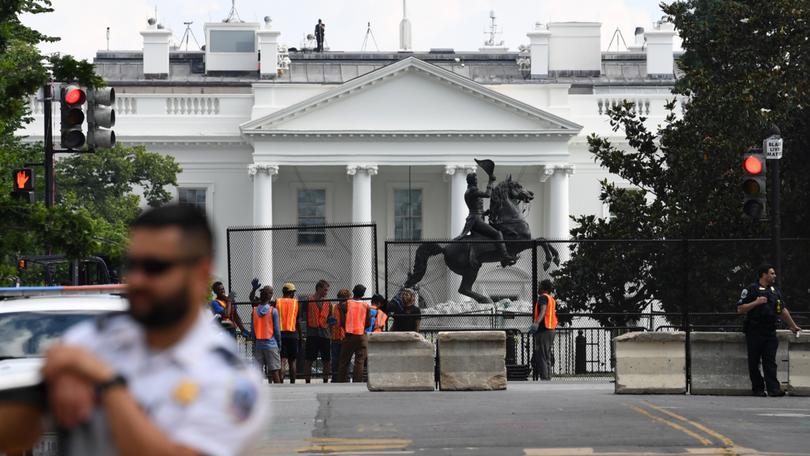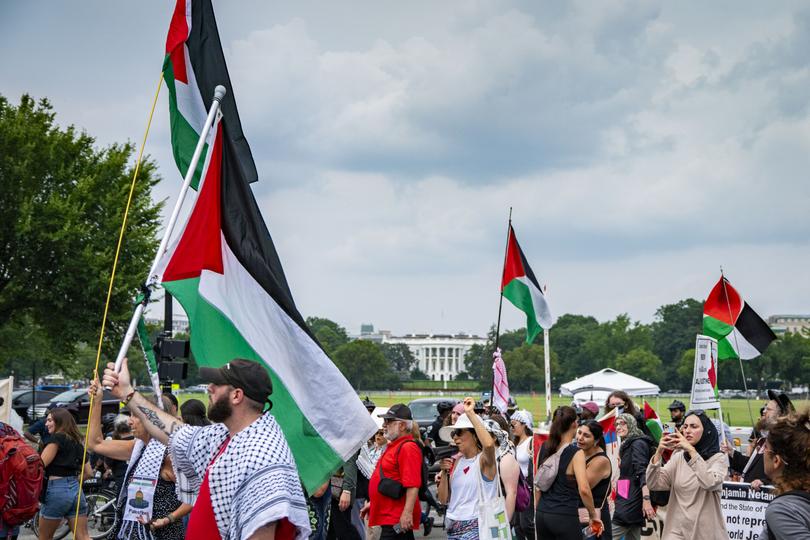Still tense from Jan. 6 riot, Washington DC locals brace for what this US election result may bring
One thing is becoming clear for Washington DC residents — no matter who is elected president next month, the consequences of the country’s toxic politics will land hard at their doorstep.

Sitting in the pews of a Northwest Washington church with weeks remaining until the election, nearly two dozen DC-area residents watched a film that forced them to contemplate a nightmarish scenario: What if a losing presidential candidate mounted an armed opposition to overturn the election results?
The prospect did not seem so far-fetched to those gathered on this Sunday afternoon in October, many of whom had lived through an insurrection and its reverberations in the nation’s capital. What’s becoming increasingly clear, they said in discussions after the docu-thriller “War Game” is that no matter who is elected president next month, the consequences of the country’s toxic politics will land hard at their doorstep.
“We are about to enter a period that is going to be extremely chaotic,” Keya Chatterjee, a former advisory neighbourhood commissioner on the H Street NE corridor, told the audience at the event, hosted by the Movement Infrastructure Project.
Sign up to The Nightly's newsletters.
Get the first look at the digital newspaper, curated daily stories and breaking headlines delivered to your inbox.
By continuing you agree to our Terms and Privacy Policy.To local officials, civil unrest is a strong possibility — one for which they began to prepare with federal partners nearly a year ago, deploying lessons learned from waves of activism and violence that marked past election cycles. For those who live near and around the US Capitol, a threat to democracy is also a practical one, potentially detouring bus routes, closing schools and roads, and leading to increased police presence in their neighbourhood.
As Nov. 5 draws near, local residents, community organizers, lawyers, government officials and law enforcement are bracing for an uncertain 11 weeks between Election Day and the inauguration — and whatever happens next.
“This is an all-hands-on-deck effort for the city,” said Assistant City Administrator Chris Rodriguez. “We are prepared. We are making sure that we are fulfilling our role as the federal city to ensure a peaceful transition of power.”
Authorities have installed fencing in key protest locations. Capitol Police have increased staffing to 2100 sworn officers — about 300 more than ahead of Jan. 6, 2021 — and expanded several units, including those in charge of analysing intelligence and responding to demonstrations, said spokesman Tim Barber.
DC local government officials have been gaming out contingencies, evaluating any potential threats and strengthening partnerships with federal agencies, Rodriguez said. In a first, the DC Board of Elections also added armed security to its office headquarters and mail ballot processing centre this year, said Monica Evans, the executive director of the DC Board of Elections.
Local activists are practising what to do if white supremacists demonstrate, a hurricane disrupts early voting or a foreign country interferes with the election. Faith leaders are meeting with nonprofits and community organizers to discuss contingency plans. And as police gear up for protests in the country’s First Amendment capital, a civil rights attorney is reminding officials of peoples’ constitutional rights after the chaos — and ensuing lawsuits — of recent election cycles.
Looming over all is the threat of another seminal event of the kind that reshaped DC nearly four years ago — and the violence that preceded it.
Nearly eight years ago, thousands of people rallied against Donald Trump’s inauguration in protests that left a trail of destruction, including setting a vehicle on fire along K Street and jamming security checkpoints. After his defeat in 2020, Trump supporters, including extremist groups such as the Proud Boys, plunged the District into chaos in the run-up to the Jan. 6 insurrection. Chatterjee recalled seeing neo-Nazis walk down her street that day in 2021, when a mob of Trump supporters stormed the US Capitol.
To those who live and work in the District, this national crisis was personal and so, too, are the stakes of this contest.
Residents who watched their Capitol Hill neighbourhood transformed into a fortified military city in 2021, with armoured vehicles and military officers, are nervous about the impact of post-election demonstrations.
“I really fear outsiders coming in,” said Gail Sullivan, who has lived on H Street for more than 20 years. “This is where the insurrection happened. … Maybe it will spill out more into our neighbourhoods than it did before.”
Tim Krepp, a Capitol Hill resident who works in tourism and has written about the neighborhood’s history, said he and his wife are asking themselves: “Where do we go if things don’t stay normal?”
“Because of the danger here, we lose public space. We lose access to things that we take for granted,” said Krepp, a former officer in the US Navy. “It’s a very direct attack on our way of life.”
On the days leading up to Jan. 6 and the inauguration, Zac Hoffman said he is already considering keeping his apartment lights off, not wanting to give any indication that he is home, and finding a garage instead of street parking for his car.
At the National Democratic Club, of which he is the club manager, Hoffman said they are working with federal law enforcement on possible evacuation routes. They also recently upgraded the club’s windows to ballistic-proof material. He referenced the pipe bombs placed near the Republican and Democratic national committee headquarters in DC the night before the Capitol riot and his concern that the person who did that is still at large.
“It’s scary. Full stop,” Hoffman said. “Between the election and the transition of power, whichever way it goes.”
In preparation, DC Mayor Muriel E. Bowser (D) successfully requested that the election certification on Jan. 6, 2025, be given the same high level of security as an inauguration, Rodriguez said, noting that the District and its federal partners have been planning for nearly a year.
Barber, the Capitol Police spokesman, pointed to shifts that he said should help with any needed response. First, he said the Capitol Police chief no longer needs to navigate a preapproval system for requesting National Guard support, a process that slowed the response on Jan. 6, 2021. Barber also noted that Capitol Police Chief J. Thomas Manger, who took over the force six months after the riot, has more frequently contacted partner agencies for assistance in responding to large demonstrations.
DC Council member Charles Allen (D-Ward 6) said Manger has regular meetings with him in which they discuss security plans and residents’ concerns.
“I have never been able to meet with the US Capitol Police Chief before this. I now have his phone number to text him when I need to,” Allen said. “I feel a very big difference from what we had four years ago.”
When Bowser meets with the Council next week about election preparedness, Allen said he hopes to hear that federal and local officials, and community and policy leaders, are engaging in tabletop exercises to practice responding to various high-stakes scenarios.
“At this point, I think that even my next-door neighbour is scenario planning,” said Rachel O’Leary Carmona, the executive director of the Women’s March, a movement that launched the day after Trump’s inauguration, when hundreds of thousands of women poured into the District and across the country in what is widely considered the largest single-day protest in American history. The group is organizing demonstrations for the Saturday before Election Day, including one in the District.

After Kamala Harris became the presumptive Democratic nominee for president, Carmona said, organisers saw a surge of new members to “Pantsuit Nation,” the Facebook group that ballooned to support Hillary Clinton’s presidential run and is now backing Harris. The question leaders kept hearing was: “When are we going to march?”
The National Park Service accepts permit applications on a rolling, first-come, first-served basis. Organisers have already submitted at least nine for possible election-related demonstrations between now and the period around the inauguration, most of which appear to be from left-wing groups hoping to reserve space to protest or celebrate the results. Final permits are typically granted closer to a proposed event date.
In preparation for the flurry of protests, Scott Michelman, the legal director for the ACLU of the District of Columbia, sent a letter in September to law enforcement agencies and District leaders, reminding them of police use of force at several protests, including the violent clearing of Lafayette Square in 2020 and the use of chemical irritants and mass arrests of people protesting Trump’s 2017 inauguration.
“Each of these resulted in lawsuits,” Michelman wrote. “I hope you’ll take this opportunity to ensure that your plans regarding any upcoming demonstrations in our Nation’s Capital are firmly grounded in respect for the freedom of speech — one of the fundamental rights on which our democracy rests.”
Lacy MacAuley, a local activist, said that on Nov. 5 she will be part of a group holding space on the National Mall for a peaceful event open to those who want to process this election as results come in. That could mean anger or fear over another Trump presidency, a “giant dance party” for Harris or any reaction they feel in the moment. MacAuley had been an organizer with DisruptJ20, the coalition behind massive protests during Trump’s 2017 inauguration that led to hundreds of arrests, most of which resulted in acquittals and dropped charges.
“That kind of feisty resistance, I believe, is what we are going to see again if Donald Trump wins the election,” MacAuley said.
To Hatem Abudayyeh, the national chair of the US Palestinian Community Network and an organizer with the Jan. 20 coalition, which has filed a permit to demonstrate on Inauguration Day, there is no difference between Harris and Trump when it comes to foreign policy and the Palestinian people.
“The whole world will be watching on that day, and we’re not going to allow them only to watch a celebration,” Abudayyeh said. “We want to force them to be watching the mass movement.”
- - -
Joe Heim contributed to this report.
© 2024 , The Washington Post
